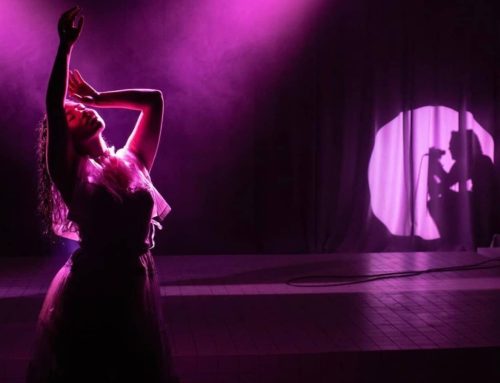Twelfth Night, Shakespeare’s tale of love, mistaken identity, ambition, and revelry, gets a decidedly Christmassy take in the National Youth Theatre’s production, adapted in a mash-up of modern language and original text by Ellen McDougall. Meghan Doyle’s zippy direction, great choreography, and Naomi Hammerton’s wonderful music keep the whole shebang on the road, but opinions will vary as to what it all adds up to.
Yule firs hang upside down from the NYT’s ceiling. As events unfold, they are soon festooned with more tinsel and baubles than your average department store. There is a heavy nod to panto traditions in much of the physical comedy and in Ethan Cheek’s colourful, exaggerated, and often playful costumes. Emily Casey’s gender-switched Malvolio, dressed as a Christmas gift, threatens to veer off into dame territory; one almost anticipates a rousing cry of “he’s behind you” when she is taunted in prison by the ersatz visiting clergymen. Cathy Sole’s Viola has a hint of a principal boy’s ‘innocent abroad’ whimsy about her, and Laura Masters’ Olivia, crimson-bedecked, has a touch of panto villain vamp.
At the outset, McDougall gives us a prologue that helpfully contextualises the backstory for Twelfth Night neophytes. “It’s dark, did I mention that?” we are cautioned by a character, as if by way of a trigger warning. A terrible tempest rages, “a storm that sends the whole world upside down”. Naïve young Viola (Cathy Sole) finds herself washed up on the coast of Illyria, apparently having lost twin brother Sebastian (Daniel Regan in country bumpkin mode) to the ravages of the sea. Disguising herself as Cesario, she becomes a trusted adviser in the court of handsome, love-struck Duke Orsino (David Olaniregun charms in multiple pearl necklaces but lacks the character’s requisite note of pompous self-absorption).
Viola’s male camouflage proves a little too successful. Dispatched by Orsino to shake the “addicted to melancholy” neighbour Olivia (Laura Masters) out of a funk of mourning, it is to Cesario’s manifest delights that Olivia’s attention turns. Olivia wants Cesario. Viola desires Orsino. Orsino loves Olivia, but “she’s just not that into you”, a character informs him. Something has to give with all these passions, “and thus the whirligig of time brings in his revenges”.
A second plot strand sees Olivia’s drunken uncle, Sir Toby Belch (Selorm Adonu bubbles with naughty teenager charisma and has a flair for physical comedy), and his dumb-as-a-doorknob friend, Sir Andrew Aguecheek (a permanently baffled-looking Alfie Wickham in fetching tights and sequined boob-tube) plot mischief. With Olivia’s maid Maria (Freya Catherine Purdie is not quite Machiavellian enough), the duo conspire to humiliate Olivia’s priggish “fun sponge” Malvolio (Emily Casey gives us Scrooge before veering into her panto dame) by tricking her into believing Olivia loves her. “Kate Middleton was a commoner” before she married, so why not me, muses Malvolio, on reading a faked love letter?
Critiquing foolishness and providing insight into ongoing events is Olivia’s jester Feste, in the forms of Fes (Dominic Semwanga) and Tay (Megan Keaveny). Splitting the fool’s role into two adds little to the narrative, but boy, can these two performers sing. Many of the ensemble play instruments as well as perform – Orsino and Cesario bond over a keyboard riff – which is a handy way of showing what the immensely likeable cast can do.
Ellen McDougall, who successfully queered up last year’s As You Like It at the Globe, hints at but never really engages fully with a queer subtext in the production. A love connection between Sebastian and the love-struck pirate Antonio (Luc de Freitas is a tad over-earnest), not a new take and always a tenuous ask, gets precious little airtime. “Both day and night, I kept company with him”, Antonio insists, but he does not convince anyone. Envisaging Malvolio as a woman hints at a homophobic undertone to her deliberate marginalisation and cruel humiliation, again not a particularly new insight, and again the issue lies unexplored. So determined is Doyle to make this piece Christmassy and as much fun as physically possible that the dark undercurrents of Malvolio’s fate get lost.
Hammerton’s gorgeous music adds spice to a wonderfully choreographed Christmas party scene, complete with party hats, conga line, and bacchanalian sexual excess. Think of it as an office bash where the punch has been spiced with acid. Doyle and McDougall’s Twelfth Night emerges enjoyable enough in its way, but Shakespeare and panto are not obvious cohabitees, and some may well depart feeling subtlety has been sacrificed for exuberant effect.
Writer: William Shakespeare (adapted by Ellen McDougall)
Director: Meghan Doyle
More Recent Reviews
Playfight. Soho Theatre.
Writer Julia Grogan’s breathtakingly assured debut play arrives at Soho Theatre following stellar reviews at the Edinburgh Fringe and [...]
All The Happy Things. Soho Theatre.
Naomi Denny’s three-hander comedy-drama All The Happy Things covers familiar themes within a recognisable premise. A grieving protagonist comes [...]
Telly. Bread and Roses Theatre.
The challenge with absurdist comedy is that many people do not find it funny. Laughing at the sheer weirdness [...]



